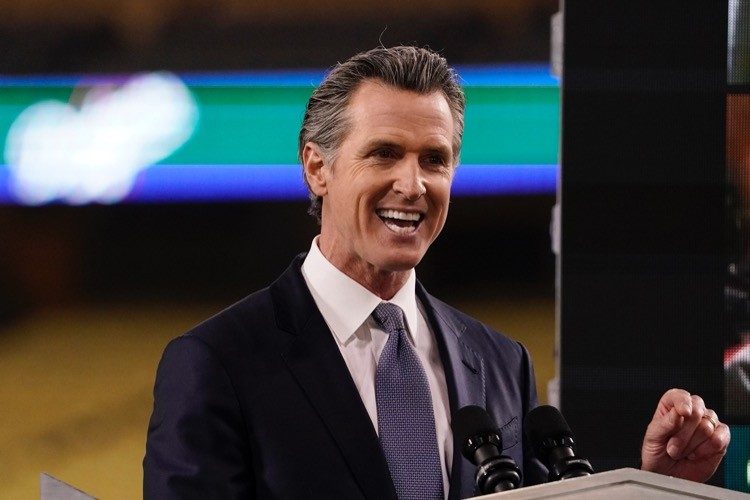
California Governor Gavin Newsom appeared to have been ignoring the recall efforts against him in his state until recently, when the recall campaign announced it surpassed the signature threshold needed to prompt a recall vote on the unpopular governor. On Monday, in what Associated Press calls “the strongest acknowledgment to date that he expects to be on the ballot this year,” Newsom established a political committee to begin raising money to defend his seat in a potential recall election that is looking more likely.
The Wall Street Journal reports that two committees circulating petitions say they have collected more than two million petition signatures to place the recall on the ballot, well over the 1.5 million required, though hundreds of thousands must still be validated by election officials, AP adds.
Tom Del Beccaro, former chair of the Republican Party and chair of Rescue California — one of the committees behind the recall efforts — acknowledged last month that the campaign needed approximately 1.9 million signatures to pad the count to account for the signatures that will not be verified.
Newsom was forced to come to terms with the likely possibility of the recall vote, tweeting, “I won’t be distracted by this partisan Republican recall — but I will fight it[.] There is too much at stake.”
Newsom has more recently been making efforts to boost his support, including traveling the state to hold events highlighting COVID vaccines and staging online news conferences.
Liberal politicians have thrown their support behind Newsom, including Senators Elizabeth Warren (D-Mass.) and Bernie Sanders (I-Vt.) and Representative Ro Khanna (D-Calif.).
Senator Cory Booker (D-N.J.) said it was Newsom’s leadership during the pandemic that “kept Californians safe and helped them recover financially” in a statement released by Newsom’s committee.
But at least two million Californians disagree with that assessment. While efforts to recall Newsom pre-dated the pandemic, they did not gain traction until more recently when Californians became incensed by Newsom’s failed COVID response, including health orders that have hurt schools and businesses, as well as an unemployment benefits fraud scandal.
“Closing the beaches and closing the parks really was the beginning, that I saw on the ground, of the beginning of the end for him, as far as people taking the recall stuff seriously,” said Anne Dunsmore, campaign manager and finance director of Rescue California.
What’s more, Dunsmore contends Newsom’s French Laundry scandal, in which Newsom attended a party at an upscale restaurant in violation of limits on such gatherings, also breathed new life into recall efforts as Californians begrudged the governor’s hypocrisy.
“I think it came to a head with the French Laundry. And that misstep on his part, made everybody more aware and more upset about the things that he had already done that were way off like the random closures, the random rolling blackouts … the extreme nature of some of the bills that he was signing, and the constant pulling over to the far-left,” Dunsmore said.
Rescue California’s website lists 10 reasons to recall Newsom, most of which are pandemic-related.
Newsom acknowledged that the recall efforts targeted his liberal policies in an interview with San Francisco’s KQED news station.
“It’s about immigration. It’s about our healthcare policies. It’s about our criminal justice reform. It’s about the diversity of the state. It’s about our clean air, clean water programs, meeting our environmental strategies,” he told KQED.
And supporters of the recall are not backing away from those initial motivators.
“The highest poverty rate in the nation, the largest number of homeless, some of the highest gas prices, unemployment checks going to death row inmates, and up to $31 billion in unemployment fraud,” the California Republican Party tweeted at Newsom. “The recall is gaining momentum because of your failed leadership.”
AP observes that Democrats have tried to paint the recall efforts as a partisan Republican-led campaign, even naming the anti-recall committee “Stop the Republican Recall.”
However, recall organizers say approximately 38 percent of the signatures have come from Independents and Democrats.
Still, Democrats are hoping to maintain Democratic support, are characterizing the efforts as a Republican-driven campaign, hoping to capitalize on the fact that Republicans are outnumbered by Democrats nearly two to one and have not won a statewide election in California since 2006, AP writes.
California Lieutenant Governor Eleni Kounalakis said Democrats must “reject the efforts of the Republican party to sow discord in our state and their longshot attempt to slip a Republican governor into the bluest state in the country.”
The California Democratic Party announced on Monday it was committing a quarter-million dollars to fight the recall efforts, WSJ reported.
WSJ also reported that several Republicans have already expressed interest in participating in a recall election. These include former San Diego Mayor Kevin Faulconer and businessman John Cox, who lost to Newsom in the 2018 gubernatorial race.
Of course, whether Newsom can actually be unseated remains to be seen. Recalls are not uncommon in California, as noted on the California secretary of state’s website. There have been 178 recall attempts of state elected officials since 1913, according to the site, 10 of which have collected enough signatures to qualify for the ballot. Of those 10, six elected officials have been recalled. And Fox News reminded readers that Californians have attempted to recall their governor 55 times, with success only in 2003 against Democrat Gray Davis, who lost to Republican Arnold Schwarzenegger.
If Newsom does survive the recall, he will be up for reelection in 2022.




